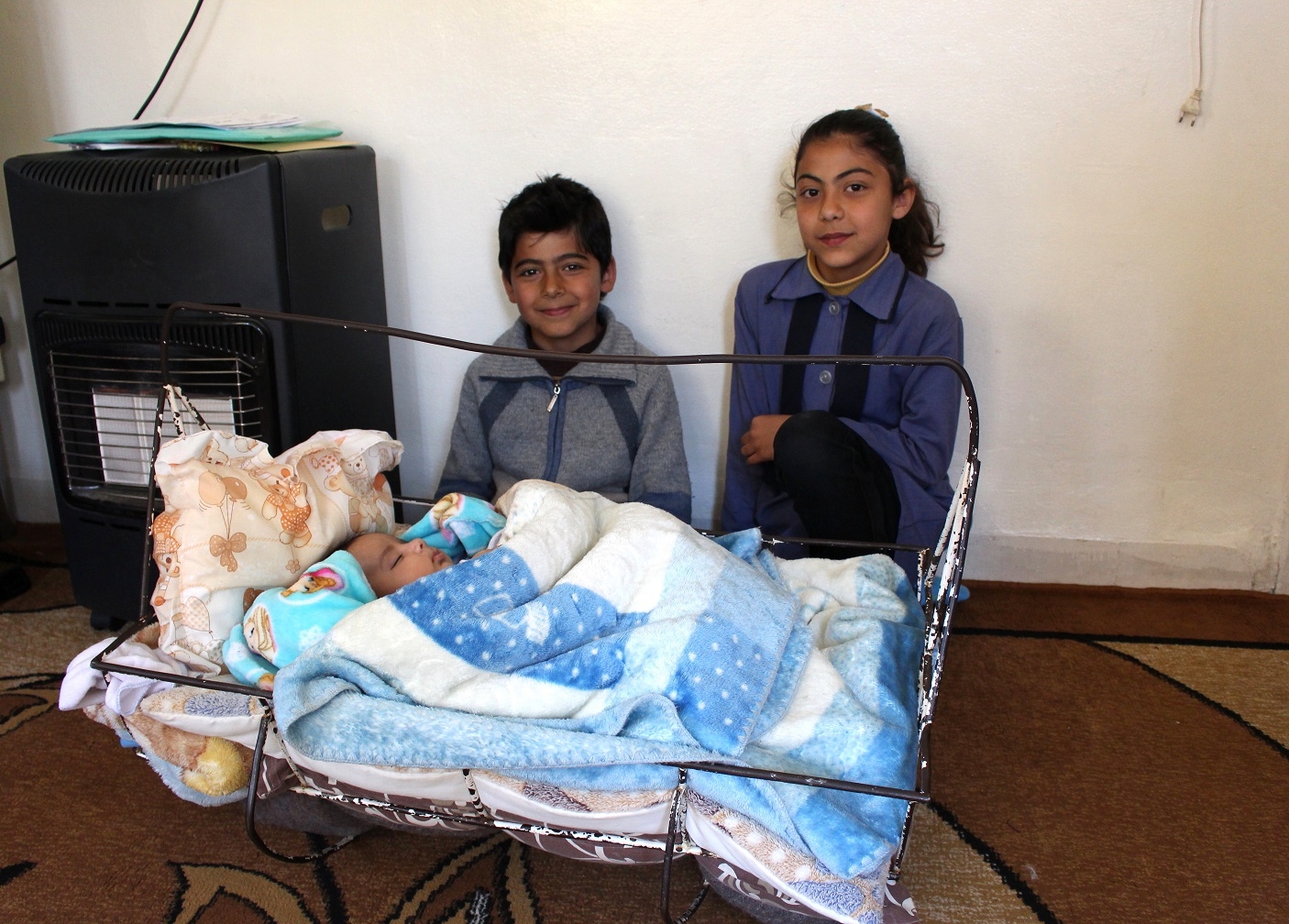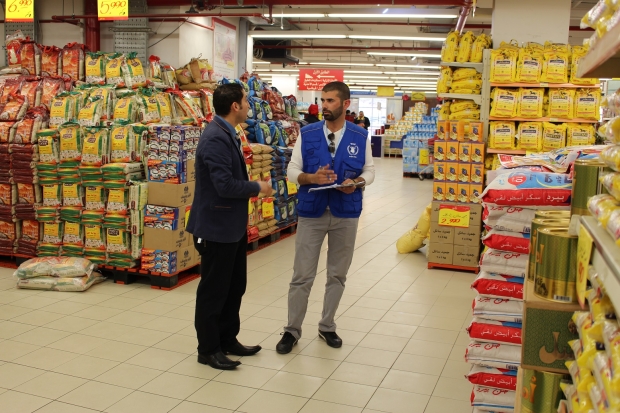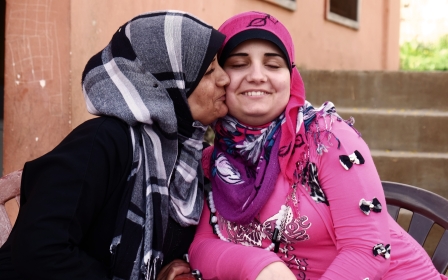Syrian families can't afford to feed their children as aid is cut

AMMAN - Umm Fadel and her family didn’t expect that that they would still be living in Jordan three years after fleeing the violence in Syria. The family of 11 now shares a small three-room apartment in Amman. While they are safe from the shelling in their hometown of Daraa, they now face a danger of another kind: that of hunger and poverty.
As she sat on the floor of the empty room holding her three-month-old baby, Um Fadel recounted what ultimately prompted their escape.
“My neighbour’s house was bombed and the children there died,” she said. Three of her own children sat around her listening silently, with a faraway look in their eyes.
She explained how after fleeing they discovered that their house had also been destroyed. Had they stayed, Um Fadel and her children are well aware that they would likely have faced the same fate.
The family risked the fire of snipers and shelling from planes above to make the long and perilous journey to the Jordanian border on foot.
Sadly their story is not unique. Um Fadel is one of almost four million refugees who have fled Syria to neighbouring countries, and one of more than 600,000 UN-registered refugees in Jordan that rely on assistance from aid agencies to survive.
Reduction of food aid
Securing the vital funds to support such a large refugee population has become increasingly challenging since the onset of the conflict in 2011. Last December, the World Food Programme (WFP) the world's largest humanitarian aid agency fighting hunger, was forced to temporarily suspend its food assistance to 1.7 million refugees due to funding shortfalls.
The organisation has recently changed its approach to adapt to the limited funds by targeting those who are most in need. The overall monthly food assistance has been reduced from 24 Jordanian dinars ($33) to 20 dinars ($28) per person, and has been cut in half for those deemed "less in need".
Ahmad Amr, who works as a field monitor for the WFP, has the distressing job of visiting around 135 households per month to check up on whether they have enough food to survive. He has been with the organisation since the beginning of the Syrian crisis, and while he has become used to seeing people suffer, he is increasingly concerned by the deteriorating situation.
“The reduction in the monthly amount has been a big challenge for the refugees. It’s really not enough for them,” said Amr. He added that although he hates seeing people lose the support that they so heavily rely on, the WFP has to make do with the funds that they have.
Amr works hard to ensure that the food vouchers go as far as they can in providing for the refugees' needs. This involves visiting the WFP’s partner supermarkets to check that the food stocked is in line with what the families need and that the prices are affordable.
In the last year, WFP logistical support to the families - despite the lack of funds - has become easier for families. The organisation switched from using paper vouchers to e-vouchers that work like debit cards, which means that refugees no longer have to travel long distances to collect their vouchers.
But even with this development, on the whole, things are getting harder for both the WFP and the families they provide for. Amr recalled a recent visit to a family who had just had their WFP assistance cut.
“They were shouting at us and saying that they couldn’t afford to feed their five children,” he said. For families like this, Amr tries to get their case repealed, but he knows that there is only so much aid to go around.
For Umm Fadel and her family, coming to Jordan and being reliant on food aid was a big shock. Back in Syria, they were farmers, gathering much of their food from the land and trading with their neighbours.
“At the beginning, the food assistance was enough to buy the essential simple things. But when the amount of money was reduced, we started facing more pressure,” she said.
Amr explained that for many families like Umm Fadel’s, the limited funds mean that they can’t afford things like fruit and meat anymore and that this is having a serious impact on their health.
Lack of education, healthcare and illegal work
In many cases the shortage of funds for food also means the loss of education for refugee children. Almost 50 percent of Syrian refugee children of school age are now not receiving any form of education, according to a recent report by Save the Children.
Three of Umm Fadel’s seven children are attending school in Amman. But due to their circumstances, two of her children of school age cannot go. Her eldest son Fadel left school at 16 so that he could work to help support the family. Now 17, he continues to work in a coffee shop, risking arrest by the police, as it is illegal for Syrians to work in Jordan.
While listening to their mother speak of the family’s hardships, Fadel’s siblings sat quietly and withdrawn. But when asked what they hoped to do when they finished school, their eyes lit up. Fadel’s younger brother Waleed wants to be a pharmacist and his sister Mais has dreams of becoming an English teacher.
Whether the children will have the chance to achieve these dreams, and whether they can remain in school, however, depends on the assistance provided to them by the WFP and other aid agencies. Even with this support, many Syrian refugee children, like Fadel, are losing their childhood and the chance at a brighter future.
According to Amr, child labour and child marriages have been increasing at an alarming rate, and the number of refugees begging on the streets is also on the rise. In a recent focus group conducted by the WFP, 30 percent of Syrian refugees said that they had become so desperate that they had resorted to begging, and 15 percent were sending their children out to beg.
Healthcare for refugees is also suffering greatly. While previously refugees in Jordan received free treatment, at the end of last year, the Jordanian government scaled back this support, saying it could no longer shoulder the financial burden.
This hit many Syrians living in Jordan hard, including Umm Fadel’s family. Her mother-in-law has severe health problems, and the family now has to scrape together more than $80 a month for her care. This has forced the family to sell their remaining assets and has thrown them into debt.
Finding new funds
As the Syrian conflict entered its fifth year with no end in sight, international aid agencies have been working hard to find a long-term solution to the humanitarian crisis. This includes a dramatic shift in aid strategy, which is outlined in the Regional Refugee and Resilience Plan (3RP).
The new strategy was introduced at the beginning of the year and aims to combine emergency relief with a more long-term development approach for countries hosting the refugees. The 3RP will enable the relief efforts to tap into the development funds of donor countries in addition to the emergency funds already available.
So far, it seems as though the new strategy has had some degree of success. In March, at a UN-backed conference held in Kuwait, international donors pledged $3.8bn in aid, which was a significant increase compared to the $2.4bn pledged at last year’s conference. But this still falls way short of the $8.4bn requested by the UN.
A volatile future
Jonathan Campbell, the emergency coordinator for the WFP in Jordan, says that unless the funding for this year is significantly increased, it is not going to be enough to meet the needs of aid organisations and refugees.
Campbell has grave concerns for the future of the crisis. “All of us can cope with something short term. But this isn’t short term anymore,” he said, pointing out that if the crisis isn’t solved soon, the consequences for both individuals and the region could be huge.
“If we’re not giving people a normal life, we’re building new problems for the next generation,” he continued. “And if we’re not giving them a foundation to rebuild … things will become more and more volatile in the future.”
Umm Fadel is worried that the world has turned its back on the Syrian people.
“I feel that we’re being forgotten, bit by bit. Our problems are still there but I feel that we have no voice anymore,” she said, adding that she believes the international community does have the power to help them.
If she could, Umm Fadel would go back to Syria.
“I wish that the country would become safe and secure again so we could return home,” she said.
But in a sad demonstration that this may still be a long while yet, she pulled out her phone and played a recording sent to her by a relative still in Syria. The eerie sound of a fighter jet roaring overhead came from the phone, bringing the Syrian conflict into the room for just a moment. Umm Fadel knows that until the fighting ends they cannot go back.
Stay informed with MEE's newsletters
Sign up to get the latest alerts, insights and analysis, starting with Turkey Unpacked
Middle East Eye delivers independent and unrivalled coverage and analysis of the Middle East, North Africa and beyond. To learn more about republishing this content and the associated fees, please fill out this form. More about MEE can be found here.





